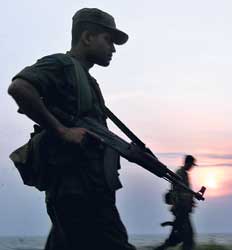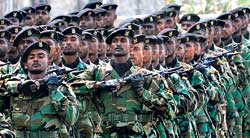
War: Impact far from the battle zoneWhichever way a person looks at it, Sri Lanka is in the middle of a fully fledged war. And in conflict situations, the invisible impact like emotional scars and disorder of day-to-day life can be longer lasting, and can run deeper than the visible impacts, such as loss of life and destruction of property. We spoke to young people from hundreds of miles away from the battlefront. Young people whose life has been affected by the war, in totally different contexts.
"I think the freedom we used to have to roam around and just hang around isn't there anymore. But we do need to understand the situation in the country" says Farah (19). Elaborating on her personal experiences she also stated, "I'm now used to the idea of having uniforms around. But it gets a bit annoying sometimes, especially if you're a girl. Then some of them tend you keep you for a bit longer. But kudos out to the Army personnel, as they are much more courteous and polite" This is a reflection of the mixed emotions directed towards the security forces. Whilst some see the constant checks and road closures as annoyances, most speak of them in a tone with gratitude. As Farah said, "Sometimes you get a sense of security, knowing the forces are doing their best to keep the country as safe as possible." Either way, it's a smug reminder of the issues going on in the country. But what are the deeper issues which peope might fail to see? Guru (23) had a different take on this, as he took things in a broader sense. "When you think about it, some of these restrictions are impeding upon our right to have fun" Talking further on the effects of war beyond travel and life in the capital city Guru's view was that "We talk about the war robbing children of their childhood. Something most of us fail to see is the war robbing young people of their youth-hood." And the sense and definition of fun has changed through time, and differs from place to place. "When you travel a couple of miles away from Colombo, into less urbanized areas, you can still see that young people do 'hang out' at places doing nothing, and they don't need a reason to stay in a certain place" said Supipi (26). She observed how the sense of security, and the security precautions themselves change depending on the location, and how the life seems less and less affected by the effects of the war as one leaves the city.
But the effects of it are getting stronger and closer as Thilini (22) who is a frequent traveller between Kandy and Colombo expressed. "I used to be a somewhat immune to the effects of the war. But with the recent explosion at the fort railway station, I now worry about all my movements, and I'm not planning on using public transport for a while." And the long lasting effects of war are now becoming more and more evident. "We as kids grew up with the war around us. We haven't known 'peace' in it's purest sense, ever. And this I feel has made us less emotional about the issue now." Says Vraie (22). She explains how young people are becoming more and more used to the violence around them. "We do headcounts now. If it's 10, or even 20 deaths now, we don't get shocked or moved by it. If it's nearing a hundred, then it becomes a shocker." And that is the developing untold crisis of our generation. The visible scars of the war are spoken of, and people attempt to find solutions for them. The silent, invisible human issues which affect the youth, and the future generations of young people who were born into, and who are condemned into growing up with the war around will leave incurable scars in everyone's minds for years to come, even after the war is over. Have your say at http://pinkboxinggloves.wordpress.com/ |
|
||||||
|| Front
Page | News | Editorial | Columns | Sports | Plus | Financial
Times | International | Mirror | TV
Times | Funday
Times || |
| |
Reproduction of articles permitted when used without any alterations to contents and the source. |
© Copyright
2008 | Wijeya
Newspapers Ltd.Colombo. Sri Lanka. All Rights Reserved. |

